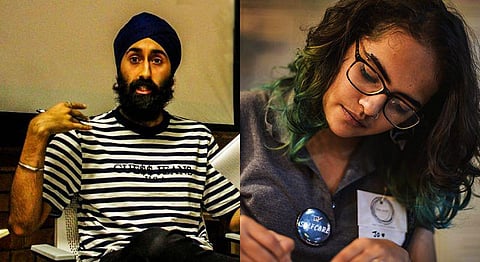
- HOMEGROWN WORLD
- #HGCREATORS
- #HGEXPLORE
- #HGVOICES
- #HGSHOP
- CAREERS
- ABOUT US
- CONTACT US

Nearly 60 million Indians suffer from mental disorders and countless more go unrecognised or unreported. India also has one of the highest suicide rates of young people in the world. As of 2015, WHO reported that there were only three psychologists for every million people in the country. Needless to say, there is a broad dismissal of the legitimacy and severity of mental health – millions of people are intentionally ostracised, subjected to careless stereotypes, and face bullying and social stigma everyday. The media does not portray mental health in sensible and nuanced ways, nor do schools and educational institutions implement programs to adequately address them. As a result the majority of India still lacks even the basic knowledge of mental health and its potentially dangerous effects.
In recent years, however, the discourse on mental health has finally begun to take hold, and many health professionals and organisations are doing remarkable work to increase awareness and challenge the stigma surrounding it. In light of Mental Health Awareness Week, we have put together a short list of some of the groups that have created a unique, comprehensive approach to tackling the many challenges of mental health faced by Indians around the globe.
It’s Ok To Talk is an online space and community dedicated to voicing difficult stories relating to mental health – whether it’s from those going through the challenges or those who see it happening to their loved ones. They believe the first step to breaking down stigma is being able to talk about it, share expressions and connect with others for support and free-flowing discussion. The organisation publishes stories across a number of different media, using a combination of arts-based approaches, collaborative and capacity building initiatives and events that create awareness and break down stigma around mental health. They are also working on an upcoming puppet show and video game that educates school children about mental health. What’s truly remarkable about their work is how multifaceted it is – they respectfully centre the emotional stories accompanying mental health while working to educate and normalise them socially and institutionally.
Taraki means being “forward-facing, progressive, and looking to a better future.” This is a movement by the Punjabi community in the UK to unify against the mental health issues they face at an individual and collective level. Founded by Shuranjeet Singh Takhar, it brings together awareness campaigns, educational courses and posters to empower and strengthen the community as a whole.
“TarakĪ was started because the way in which mental health is understood within the Punjabi community has created an atmosphere in which shame, fear, and silence dominate discussions. Such negative assumptions have the impact of stigmatising mental health, silencing discussion, and casting aspersions which look to explain its occurrence through a limited framework,” reads their website.
Indian immigrants are at large a stigmatised group, and particularly in the UK where the suicide rate is highest among men, Taraki has developed a little-known but much-needed effort to tackle mental health within the diaspora.
Trijog is a progressive platform for mental health care and well-being, where they encourage you to care for your mind as you would your body. Consisting of a team of qualified professionals and licensed counsellors, Trijog creates a safe and nurturing environment for each client in an affordable and confidential way. Additionally, they partner with schools, to build emotional maturity and set up counselling services; with corporates, to develop employee mental health programs and awareness workshops; and digitally in the media, to reach people across India and deconstruct stigma around mental health.
Based in Powai, Mumbai, Trijog has had tremendous success in shifting the conversations around mental health and more importantly, with reaching out and providing support to those dealing with a whole spectrum of issues.
The Circle is a support group and healing space, by and for young Indians, where they can open up about stories “of abuse, embarrassment, shame and trauma without facing judgement, moral policing or stigma.” In 2014, four friends from Wilson College in Mumbai, including Pooja Nair, began discussing the widespread sexual harassment that women face. They found in each other a safe space where they shared personal stories about sexual abuse. They decided to create a community for others to join and share their stories without fear or shame. The Circle, now four years old, meets at the homes of the members in Mumbai and Bangalore.
One of their members, Aarti, described the aim of The Circle perfectly: “Just like you don’t need to be a doctor to attend to a wound that needs urgent attention, with some basic understanding of how the mind works and loads of empathy, one can become a sympathetic ear for anyone in need of healing.”
The Bare Talk’s mission is three-fold: to create awareness about mental health as it relates to sexuality and sexual health, to provide a good learning environment in the field of psychology, and to provide support to those seeking help. The idea of Bare Talk is to provide comprehensive support to everyone, especially adolescents, across a range of relevant issues, from sexual intimacy, consent, body positivity and reproductive health to cognitive support, special needs tutoring, bullying, anxiety, depression and career counselling. They provide classes, workshops, counselling and hypnotherapy sessions as well as education support and psychological assessments. In addition, their online work features interesting books, films, articles and discussion forums about a number of topics – from clitoral pleasure to schizophrenia.
This article is part of Homegrown’s campaign for Mental Health Awareness Week. If you’d like to share your mental health journey with us, write in to editor@homegrown.co.in
If you liked reading this article, we suggest you read:
